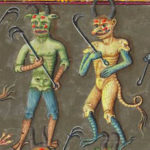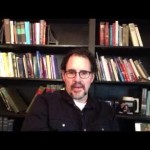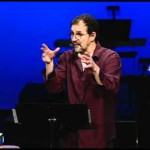We run our website the way we wished the whole internet worked: we provide high quality original content with no ads. We are funded solely by your direct support. Please consider supporting this project.

When God Regrets
The openness of the future is illustrated in the Bible’s depictions of God as grieving the outcome of decisions he himself has made. Regarding the incredible wickedness of humanity before Noah, for example, we read, “The Lord was sorry that he had made humankind on the earth, and it grieved him to his heart” (Gen 6:6). How could the Lord possibly be sorry for making humanity if he was eternally certain they would turn out exactly this way when he created them?
Some interpret this expression as anthropomorphic. But we must ask, “What is this an anthropomorphic expression of?” If the Lord didn’t really regret his decision to make humans, what does the expression that tells us he did regret making humans truthfully communicate to us? Suppose that God truly wanted to tell us that he sometimes truly regrets decisions. How could he do so in terms any clearer than in this passage?
Another example of God’s regret is found in the story of King Saul. God had intended to bless Saul and his descendants (1 Sam 13:13), but Saul’s behavior as king altered God’s intentions. After his appointed king chose a rebellious course of action, the Lord told Samuel, “I regret that I made Saul king, for he has turned back from following me (1 Sam 15:11). And again the author writes, “And the Lord was sorry that he had made Saul king over Israel” (1 Sam 15:35). The Lord could only be sorry for making Saul king if he had hoped for a different outcome than what transpired. And this would mean that Saul’s fate was not a foregone conclusion when God made him king.
God took a risk in making Saul king. The risk depended on choices Saul made. When Saul thwarted God’s purposes, God suffered a loss. This created the experience of regret. The open view of the future teaches that God hopes each individual will turn to him and walk in his ways. But if love is the aim, then freedom is the means and risk is the price. Things may not, and did not, turn out as God would have hoped.
However, God is never at a loss concerning his response to rebellious agents. God knows all future possibilities, all future certainties, and is in control of the overall flow of history. He is never unprepared, and in his infinite wisdom he is able to redeem good out of evil in ways we could never anticipate.
Because the Lord possesses unlimited intelligence, he can attend to and anticipate numerous possibilities as thoroughly as if each one were the only future that could come about. Whichever possible course of action gets actualized, it is from God’s perspective as thought this were the only course he had to concern himself with.
The open view sacrifices none of God’s ability to respond to the future. Finite creatures have their intelligence stretched thin the more possibilities they have to entertain, but not God. When a person like Saul fails, God already has a person like David waiting in the wings. Scripture reveals a God who is utterly confident of his ability to achieve his overall purposes despite the sinful rebellion of his creation. So confident is he, in fact, that he is willing to risk some loss with free agents in order to open the possibility of fellowship with them throughout eternity. He is willing to suffer frustration, disappointment and grief in order to share the joy of this triune being with others.
—Adapted from Satan and the Problem of Evil, pages 102-104
Photo Credit: NASA via Unsplash
Category: General
Tags: Divine Foreknowledge, Free Will, Future
Topics: Open Theism
Related Reading

How People Misunderstand Open Theism
Open theism holds that, because agents are free, the future includes possibilities (what agents may and may not choose to do). Since God’s knowledge is perfect, open theists hold that God knows the future partly as a realm of possibilities. This view contrasts with classical theism that has usually held that God knows the future exclusively as a domain…

Podcast: Doesn’t Jesus Violate the Free Will of Demons When He Casts Them Out?
Greg discusses the free will of demons and speculates on whether God is ever violent towards spiritual entities. http://traffic.libsyn.com/askgregboyd/Episode_0163.mp3

Free Will: Are studies that demonstrate genetic determinism a threat to free will?
Greg shares his continuing thoughts on free will with a thought experiment (and a hand-drawn graph!) granting that we are largely determined by forces outside of our control. If we grant this presupposition, does that mean that free will is an illusion or insignificant? Find out!

Love and Free Will
God could have easily created a world in which nothing evil could ever happen. But this world would not have been capable of love. God could have preprogrammed agents to say loving things and to act in loving ways. He could even have preprogrammed these automatons to believe they were choosing to love. But these…

Why believe in free will? [Video]
In this video excerpt from his April 29, 2012 sermon tracing the Pietistic influence on Woodland Hills Church, Greg explains why they—along with John Wesley—believe that God does not control everything, but rather gives human beings free will.

Did Free Will Evolve? (podcast)
Greg considers how free will emerged from the churning chaos of evolution.. Episode 613 http://traffic.libsyn.com/askgregboyd/Episode_0613.mp3
